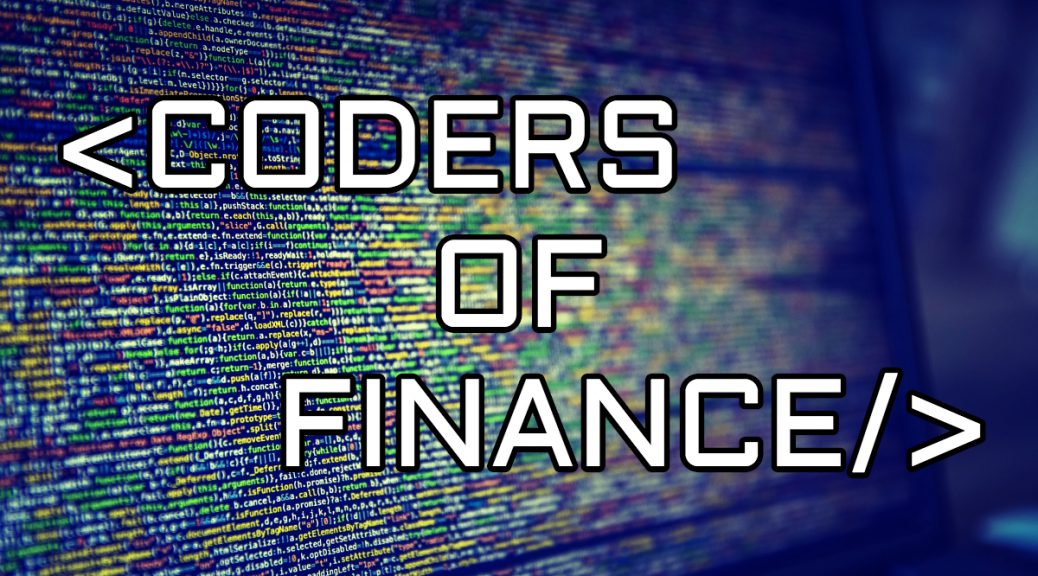
Coders of Finance – Ms ZiYou
Welcome back geeky FIRE seekers. At the end of an earlier episode, I promised you that in two weeks I will present you the first interview with a female coder-blogger. That mission failed back then but I am happy that finally, I am able to fulfill my promise. Today I brought you a fellow European, a very talented young feminist whose writings brought me multiple epiphanies so far despite I only follow her blog for a couple of weeks. Our communication started with a small argument but fortunately turned into this new episode. 🙂 Enjoy!
Introduction
Tell us about yourself!
Hey everyone, I’m a 37-year-old single woman from London, who works in the IT sphere. I’m working towards FIRE and have an anonymous blog, Ms ZiYou documenting my journey. I want to show women they can work in tech, and by my answers below, you’ll see you don’t need to be obsessed with computers to do so.
The Beginning
When was your first encounter with computing?
I don’t really know – there was one BBC basic computer I remember in our primary school, which must have been the first I used. We used it to play old school games, such as Grannys Garden. Computers weren’t really a thing. At my secondary school, there were a few more computers, but even the computing class had 3 students to one computer. And at university, there were a few more computers, but they were not everywhere. We had a uni email but no-one to email. A lecturer told our class he had emailed us something, and we laughed at him.
What was your first machine?
I never had my own computer until the last year of uni, and that was mainly used (with dial-up) for the new-fangled internet and writing up uni work. I have no idea what it was, but I do know it cost me £1000, which was a lot of money. But I had the internet at home!
Did you started with games first or jumped straight into programming?
I’ve never been a gamer or even a hardcore programmer – I don’t think they are essential skills you need to work in the IT industry.
What about education? Was it related to computing? Did you learn in a traditional way? What kind of degree do you have?
I have a BEng in chemical engineering, a very STEM subject. We used Matlab a lot, did some Autocad. One the actual programming side, we were not a very good class academically but we had a collaborative spirit that now serves me well in the corporate world. There was one VB project, that the whole class mega-collaborated on. You have to remember, at this time no one had a computer of their own, and our department only had 6 computers for about a thousand students, and computing rooms that could be used out of hours. It was just easier to share a computer and work together.
Career
When did you start to work? Was it in your field? How was it?
After uni, I worked in engineering for a few years, then decided it wasn’t for me. I then looked at my options and took a part-time job in a call centre to work out what to do next. A few months later, a full-time analyst job that interested me came up, and I grabbed the opportunity with both hands. I thrived in the new job, and my programming career began. I taught myself VBA, SAS, and SQL, and my role grew. The first promotion I went for I didn’t get and was devasted, but then a promoted position was made for me (my job was regraded) and I managed to ace that interview. I then got an internal sideways move to another team and delved hardcore into a more technical role. It was great fun, and eventually, a promoted position was again made for me which I interviewed for and got. After doing my time in industry, I lucked upon a consulting job that was recruiting for my exact skillset. I relocated to London for the job, which was absolutely the right decision. And after a few years, I left to consult freelance myself.

What are your experiences about the industry?
I’ve worked in good places and less good places. What I will say is that culture is local, and one team in a department can be very different from another team. I’ve worked in places where 50+ hour weeks were expected, and the work hard, play harder culture encouraged. And in other places where apathy and death by committee is the norm. In reality, I’d encourage trying out lots of places, only then you will know what type of company and team really works for you.
How do you see the situation of women in our field?
Tech has a massive women-problem. And it’s multi-faceted. Women are neither studying STEM enough nor are enough applying for tech roles, so there are not enough women coming into the industry. But that’s not the real problem. Bigger issues become apparent in tech roles when women have a much bigger attrition rate and lower promotion rate. The brogrammer stereotype is the reality of lots of tech departments, and the culture is such a turn off to women.
Finances
What is your current financial situation and what are your financial goals?
My personal finances are doing amazingly well, I’m well on my way to achieving financial independence, and on track to reach there in 2.5 years. If you want the actual numbers, you can find them all over my blog, starting on my numbers page.
Tell us about your journey so far?
I start seriously saving for early retirement in 2015 and ramped up my efforts in 2016. So now I’m 2.5 years into my 5-year plan and things are going well. My income helps me keep my savings rate of 80%, which is key to such an ambitious FIRE plan.
How did your profession affect your finances (directly, indirectly)?
There is no doubt, without earning six figures I would not have been able to get to financial independence so quickly. So I am very thankful that my skillset has parlayed into a high earning profession.
Opinions
Did you regret becoming a coder? What would you change?
No regrets really, apart from not learning to make better money sooner in my career. I go into more details on this post what prevented me from earning six figures earlier. But given I learned in the end, it’s not a big regret – we all make mistakes along the way.
Would you recommend starters/career shifters to step on this path?
It’s certainly a great field to move into, but you need to make sure you are doing it for the right motivations, not just for the money. If you are naturally curious, love solving problems and don’t rest until you find the perfect solution you’ll be a great fit. Likewise, if you can explain the complex, framework issues and explain a problem to a coder and a business person, there is also a role for you.
Tips for beginners?
Everyone has to start somewhere, and there is no such thing as a silly question. If you want to start coding, there really is no better time than now to start. There is an abundance of free courses and tools online, all you need is to dedicate some time and brain power.
How would you encourage young girls to step on this path?
From my perspective, we need to ensure that we are encouraging kids of both sexes to get interested in the sciences at an early age. We need to root out all biases and provide girls with amazing role models who they can aspire to emulate. I’d expect young girls to get the same education and guidance as young boys, and any deviations to be challenged.

Goals
What are your short-term and long-term goals for the future both financially and professionally?
My short term and long term plans are exactly the same at this stage.
Professionally that’s an easy question – I just aim to keep in contract at good rates for the next 2.5 years. I’m at the stage I’ll basically do anything if they pay me the right amount.
And that 2.5 years is relevant financially, as that’s when I forecast I’ll have enough funds to declare myself financially independent. All I need to do is keeping in work, maintain the 80% savings rate and the stock market not to crash.
As far as I know, you have been bitten by the travel bug. What are the most interesting places where you have been and what are on top of your bucket list?
Life has been good to me on the travel front so far. I’ve seen a lot of Europe and been on some amazing long-haul trips. You can see my full country list in this post. Trips that were especially epic were Peru and the Inca Trail, a trip that been long on my bucket list. Another even more epic was a Serengeti safari and climbing Kilimanjaro. Weirdly I did not even originally want to go on safari, but it seemed silly to not go since it was next door and not that much extra money. However, on the safari I was blown away by the wildlife; nothing can compare you to seeing wild lions by your truck or wild giraffes and zebras.
My bucket list is long, as well as the 150 countries I have not yet been to there are loads of places I want to explore again or in more detail. Top of the realistic list at the moment is Italy; I just love the food and wine there. And long term, when I retire I am going to slow travel and live nomadically for a good few years.
If you would start your own startup what would it be about?
I am 100% ready for a startup but have not been visited by that great idea yet. I am always on the lookout, who knows when the idea will land. On a serious note, weirdly I’m pretty sure I could run a startup and do all the business stuff no problem, it’s just that idea that I can be truly utterly passionate about that has not yet arrived.
Preferences
We coders have our eternal debates, let us know which side do you stand?
Favorite…
- Desktop OS: Anything – I run Windows at home, but use a lot of Unix at work.
- Mobile OS: Android – I maintain an anti-apple policy.
- Machine: Anything – I’m not fussy, and all processing is done on the cloud nowadays.
- Browser: Chrome
- Programming language: I don’t really care anymore – I’m a gun for hire. I do love SAS though.
- And the most important… spaces or tabs: Tabs. Spaces suck.
Coding exercise
Would you write a couple of lines of code to present a simple financial principle?
I also suck at these. Instead, I’d say that in the corporate world, being able to talk clients out of silly requests is a skill you should prioritise.
Epilogue
Thank you for contributing to the series, I really liked your answers. I am pretty impressed with your consistency in maintaining your 80% savings rate and fast-tracking your FIRE journey to five years. All this while resisting lifestyle inflation and still achieving travel and other goals. Kudos to you!
I also think that all kids should be encouraged to experiment with science. The only reason that I asked about girls because according to my experience they need more encouragement to step on this path, mainly because of the stereotypes. I honestly think that we need more balance between the genders in our profession and that’s why I am a big fan of organizations like Girls Who Code. Having daughters myself I really hope that someday they will dive into the wonderful world of computing even if their final career decision will be totally different.
Hope you enjoyed this episode. See you soon.
4 thoughts on “Coders of Finance – Ms ZiYou”
Thank you, Ms ZiYou. I really enjoyed learning about your story. I started coding rather late in life (late 30s). I wish I would have discovered it sooner. I’m not saying I would have been a fantastic programmer, but I seem to have been tailor made for the vocation. I never got frustrated with a problem. I would just keep plugging away until I solved it. Anyway, I’ve been retired for almost two years now. And I haven’t written a lick of SQL or VBA since I said goodbye to gainful employment. I do miss the coding, though. Hope all is well on the other side of the pond. Cheers.
Hi Mr Groovy, thanks for your kind comments.
Yeah, it does sound like a shame you didn’t discover programming until later in life – although I’m glad you found your calling in the end.
And yes, I don’t actually write code outside work, so I can see me following your path and not writing code when I retire too.
Fascinating story Ms ZiYou!
It looks like we’ve shared a very similar career path, the “I’ll basically do anything if they pay me the right amount” approach summarises freelancing well indeed!
Absolutely agree with your thoughts on encouraging kids to learn sciences. Programming should be a core competency for everyone these days, basic concepts like control of flow and efficient design are applicable to everything from setting up a kitchen to designing processes around financial month end at mega-corp.
Hi Indeedably – I love your idea on teaching programming to all – it really can be used in so many ways!
Comments are closed.